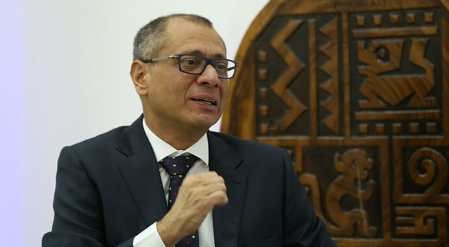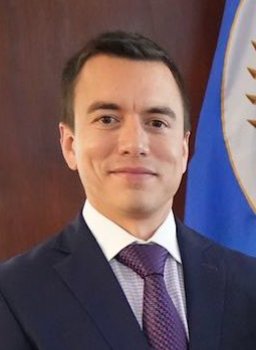Latin America Advisor
Latin America Advisor
A Publication of The Dialogue
What’s Driving Tensions Between Ecuador & Mexico?
 Ecuador’s president authorized police to force their way into Mexico’s embassy in Quito to arrest former Ecuadorean Vice President Jorge Glas. The incident led Mexico to sever diplomatic relations with Ecuador. // File Photo: Ecuadorean Government.
Ecuador’s president authorized police to force their way into Mexico’s embassy in Quito to arrest former Ecuadorean Vice President Jorge Glas. The incident led Mexico to sever diplomatic relations with Ecuador. // File Photo: Ecuadorean Government.
Ecuadorean police forced their way into Mexico’s embassy in Quito on April 5 to arrest former Ecuadorean Vice President Jorge Glas, whom Mexico granted asylum after he was indicted on corruption charges. The raid led Mexican President Andrés Manuel López Obrador to cut off diplomatic relations with Ecuador, and Mexico filed a lawsuit against Ecuador at the International Court of Justice (ICJ). What is at the root of the tensions between Mexico and Ecuador, which were already simmering before the raid, and what is driving the escalation of the conflict? What motivated Ecuadorean President Daniel Noboa’s decision to authorize a raid of Mexico’s embassy? What will come of Mexico’s complaint against Ecuador at the ICJ?
-
Arturo Sarukhan, board member of the Inter-American Dialogue and former Mexican ambassador to the United States: “The violation of sovereignty at Mexico’s embassy sets a dangerous precedent for the Americas, especially with a growing rejection of international norms and standards. There’s no excuse, spin or sugar coating that can justify Ecuador’s actions. Noboa flagrantly breached the 1961 Vienna Convention when heavily armed personnel stormed and raided the mission and forced their way in to arrest former Vice President Jorge Glas, who had been holed up there since December. But these unacceptable actions did not occur in a vacuum. Diplomatic tensions between Ecuador and Mexico are just one of a recent series of conflicts that López Obrador has triggered with other Latin American leaders with whom..”
Read More
Top News
Revolut Plans to Spend $100 Mn on Mexico Operations

Ecuador’s Noboa Orders Two-Day Shutdown Amid Energy Crisis
Complete editions of the Latin America Advisor are delivered every business day to members of the Dialogue's Corporate Program and other subscribers. Sign up below for a complimentary preview subscription.
About the Latin America Advisor
The Inter-American Dialogue publishes the Latin America Advisor every business day for a distinguished membership of informed corporate leaders, scholars, and government officials invested in Latin America’s development and future. The Advisor‘s highly regarded Q&A section covers questions submitted by subscribers themselves. Commentators regularly include heads of state, business leaders, diplomats, economists, analysts, and thought leaders from around the world. Many of the world’s largest and fastest-growing companies subscribe to the Advisor. To subscribe, click here. For terms and conditions, click here. For more information, contact Gene Kuleta, editor of the Advisor, at gkuleta@thedialogue.org.
Subscribers See all







Staff
Gene Kuleta
Editor
P. 202.463.2920
E. gkuleta@thedialogue.org
Carl David Goette-Luciak
Reporter
Nili Blanck
Reporter





















